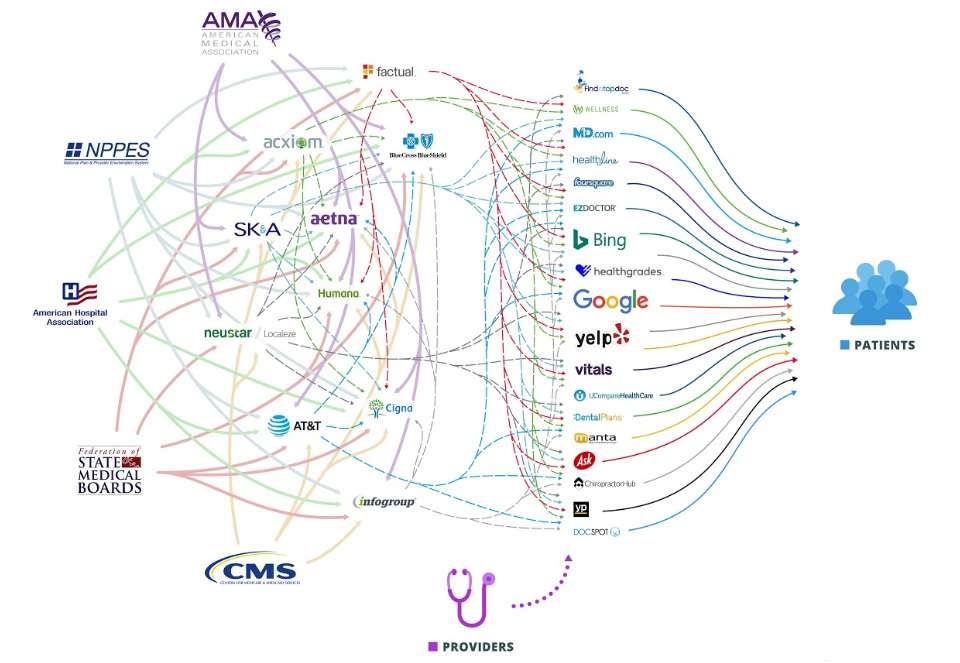Why it’s more important than ever for rheumatologists to get their data in order
Google and Bing are just a couple of popular sites that have become household names. We use them on autopilot to accomplish certain tasks and access information as quickly as possible. Whether that’s booking a hotel room, finding a restaurant, or even picking out a Halloween costume, the first line of attack in 2019 is a smartphone or computer. This new consumer behavior has had a huge impact on healthcare providers — and even more so on rheumatologists.
Based on recent studies, more than 50% of rheumatologists suffer from incorrect data online — or they don’t have a digital footprint at all. As much frustration as this might cause providers, it’s a much bigger pain point for patients seeking care.
The modern-day patient journey has drastically changed from what most rheumatologists are used to. Finding a doctor today is no different than finding a hotel room, with the internet playing a critical role in the patient’s search for care. As reported by NBC, “80 percent of internet users, or about 93 million Americans, have searched for a health-related topic online, according to a study released Wednesday by the Pew Internet & American Life Project. That’s up from 62 percent of internet users who said they went online to research health topics in 2001.”
Patients actively research physicians to find out what conditions they treat and insurances they accept, and they read reviews left by others before deciding on a provider. This is a new world for a lot of doctors. The traditional referral-based or “word-of-mouth” model has been supplemented — if not wholly replaced — by internet research. When someone gets a provider recommendation from a friend, family member, or acquaintance, the next thing they do is enter that name into a search engine or medical directory.
It’s true that this behavior is trending upward among millennial and Gen-Z patients. But it’s popular with the older demographics, too. They are also turning to the web in their quest for care: Inc. reports that more than three-quarters of patients age 60+ go online for healthcare-related purposes.
Overcoming patients’ trust issues
When a patient picks a doctor and decides to book an appointment, they either opt for online scheduling tools or look up a doctor’s contact information on the web. Unfortunately, what patients are finding isn’t always in sync with a doctor’s current information.
With patients more digitally savvy than ever, it’s a doctor’s professional responsibility to ensure their online information is accurate.
Why do so many websites carry the wrong information? Countless third-party data sources feed inaccurate or outdated information to top patient destinations (think: Healthgrades and Vitals, among others). This confuses patients. They don’t know what’s the right phone number, hours of operation, insurance list, etc., because each site displays contradictory information. Should they trust Google? Healthcare directories? The provider’s own website? Should they just start calling each phone number to see what’s a dead end and which connects them to your office? Do they visit your office hoping you take their insurance? A wrench gets thrown into the experience, making it much more difficult for current and prospective patients to get the care they need.

Healthcare’s tangled web leads to major discrepancies in physician data before it gets to the patient.
I’m a rheumatologist, and I’m already overbooked. How does this affect me?
Rheumatologists are in hot demand and short supply like never before, which means actively marketing your practice is probably not a priority. But patients still need rheumatological care, and they will always need rheumatological care. They must be able to locate available rheumatologists near them, learn about individual providers, and reach out to schedule appointments. The internet is mission critical to this experience.
Rheumatologists should do everything in their power to make this process as seamless and patient-centered as possible. With patients more digitally savvy than ever, it’s a doctor’s professional responsibility to ensure their online information is accurate and address this all-too-common patient complaint about their journey to the doctor’s office.
If you’re not proactively taking charge of the information about you online, you’re opening up a huge possibility that flawed data is controlling what patients find out about you — augmenting their pain points and causing deeper frustration. Combatting the constant inflow of inaccurate information from third-party sources isn’t just vital to the success of your practice. As a rheumatologist, presenting clean data is your duty to patients.
Doctor.com can help clean up your data and strengthen your online presence. Schedule some time with a practice consultant here.